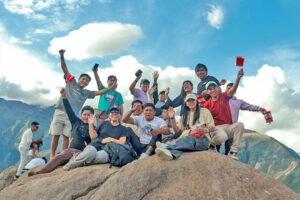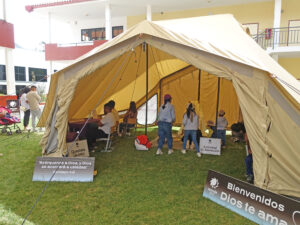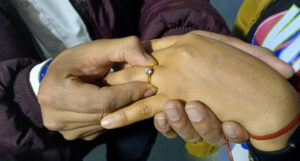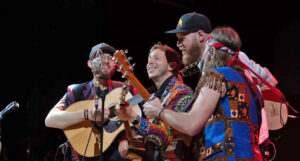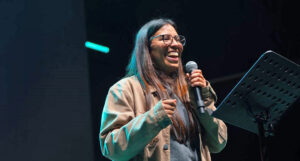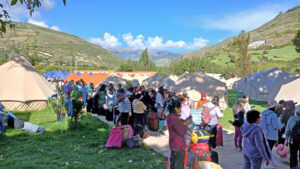Memories of China
My sat-nav guides me straight to Rigaer-Straße 86 in Berlin-Friedrichshain. The house facade shines multi-coloured. Several houses in this suburb are being occupied and – as I discover later – a demonstration by the left-wing autonomous scene is being held this afternoon. Inside I am giving a Diospi Suyana presentation at 5 p.m. But where exactly is the location?
Nothing gives even a hint that there is a church here. I look closely at the many doorbells. Wow, indeed next to one bell I read the name “Jakob Gemeinde”. What have I let myself in for?
I have arrived well in advance, I have two hours to kill, and so I climb back into my warm car and start reading Philip Yancey’s book about his travel experiences. In the chapter I read he speaks about his experiences in China, where Christians live their faith in underground churches.
It is just before 5 p.m. The small location in the backyard is still empty. Paul Clarson, the pastor, and Mr and Mrs Kügler are making the final preparations. The Küglers have organised the talk and are coming to Diospi Suyana in 2018 to start working as caretaker and nurse respectively – suddenly the run starts. A stream of people flows steadily through the door and at 5 past the hour all 70 seats have been taken. A welcome and two songs precede my talk.
Seeing so many people crammed into such a small space reminded me of the situations of so many Chinese house-churches. Despite strong political repressions stemming from the atheistic state machinery the number of Christians has grown from roughly 4 to 100 million since 1949. / KDJ
In his travel reports Philip Yancey describes meeting Christian leaders of the underground movement…
“Brother Shi entered the room, or should I say burst in. Brother Shi had nothing of the restraint that the other villagers that I met showed. He was a lawyer, quick-witted, intelligent, ingenious and I expected he was successful in everything he put his mind to. I thought he was in his late 20s, actually, as he informed me, he had just celebrated his 44th birthday.
I asked Brother Shi, if he was brought up in a Christian family. “Quite the contrary. My parents were atheists. I was leader of my province’s communist-youth-league and member of the Red Guards. The party leader saw me as his successor. On my daily cycle to work I passed a “Three-Self Church” (a Protestant Church which China recognizes, but also controls.) The church was regularly packed with people, who sang praises and talked avidly with each other. This intrigued me. I had tried hard to motivate so many people to come with me to one of my youth-league meetings, but without any success. How could this church attract so many people, especially if one bears in mind that we looked disdainfully at Christians?
Then one day I locked my bike outside and entered the church with my head bowed low – I did not want to be noticed by anyone. What a shock! Up until that day I thought that only old people and criminals went to church. What I saw was several young people speaking powerfully as they gave testimony about their experiences with God. I was there again the following Sunday and was recognised. People nudged their neighbours and nodded in my direction, thinking I was a party spy.
For 8 Yuan (three days of my salary) I bought my first Bible and started to read. That night I read the whole of Genesis, I could not sleep. Within a couple of days I had read the book from cover to cover.”
Incredulous I (Philip Yancey) interrupted: “The whole book? What did you make of Leviticus, Numbers and Deuteronomy?”
“I read every word, from the first to the last page, like I would read a novel. Of course I did not understand everything. But the things that were written about human nature seemed to me to be more plausible than what I had learnt from the Communists. I started to believe. I was 27 at the time and was in inner turmoil for a long time. I knew full well that my career would be over as soon as I publicly professed my faith in Christ. I could stand it no longer. I went to my party leader and communicated my resignation. He did everything in his power to change my mind, but it was made up. When I came home that evening my livid father was waiting for me at the door. The party leader had called him. “I fought against Christians under Ching Kai-Shek,” he screamed, “I fought against Christians in Korea! I will not let Jesus come into my house! If you really want to follow this Jesus, then get out now.” He threw my belongings out onto the street and for next six weeks I lived in my office. Every time I encountered my father in public, he provocatively turned his face away.”
Brother Shi told me a whole string of hair-raising adventures, which I felt would complement the Book of Acts perfectly. He travels from village to village to train house-church pastors. He is constantly on the move and the secret police are always close on his heels. Many times he has escaped them by a hair’s breadth. Shi has wife and child, but he can only see them once or twice a year. After his grandson’s miraculous healing Shi’s father is also a believer.
There are currently roughly 1,000 bible schools and seminaries in China and Brother Shi tries to visit them regularly. He has recognised that good theological training is the most important challenge for the Chinese Church. I asked him, “You work together with several church leaders. If you counted all the members of the churches for how many people of the not-registered church are you a bishop equivalent?” He paused for a moment and then answered: “That is very hard to say. My best guess is 260,000.” Brother Shi has to use a pseudonym, receives no recognition and all his work is done in secret. I could not help comparing his life to that of celebrated US-evangelists…”









